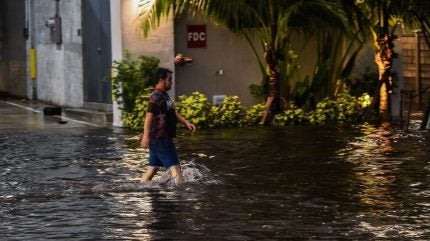

Described by UN Secretary General António Guterres as a “code red for humanity”, the landmark report by the Intergovernmental Panel on Climate Change (IPCC) offered a stark picture of the next century.
The 4,000-page Sixth Assessment Report provides a meticulous account of the current state of the scientific consensus on climate change, citing thousands of individual studies by the world’s leading authorities.
Among the findings were new projections for expected sea level rises under different scenarios, ranging from a rapid reduction in carbon emissions to a full breakdown in international cooperation. You can explore the projected increase in sea level in your city below.
Visualisation by Georges Corbineau
It’s the end of the world as we know it
Sea levels have risen faster in the 21st century than at any time in the past three millennia, putting many of the world’s coastal cities at risk of devastating floods.
Even in the IPCC’s most optimistic scenario, in which emissions are reduced to net zero before 2050, sea levels are expected to rise by almost a metre in Manila and New Orleans by the end of the century. Under the worst-case scenario, sea levels in the two cities could rise by close to two metres.
The report found that it is virtually certain that sea levels will continue to rise until the end of the century and will most likely continue to rise for centuries, while remaining elevated for thousands of years.
In recent years, more than one-third of the rise in sea levels has been due to the melting of ice sheets. If warming is not limited to 1.5°C, the Arctic is expected to become “practically ice free” during some Septembers.
According to the report, the world is now warmer than it has been in 125,000 years and the effects are already evident. Human-induced climate change has caused weather extremes, including heat waves, droughts and floods, to grow in frequency and intensity across much of the world.
Among the report’s findings were that the previous goal of avoiding 1.5°C is increasingly unlikely, with the milestone expected to be breached in the 2030s. Though the report did not spell it out, the implication was that political inaction over the past few years has already led to an appreciable narrowing of our chances to limit climate change.
At the same time, the report offered reasons for hope. If emissions are reduced rapidly in the next decade and net zero is reached globally by 2050, 1.5°C can still be avoided.
The scientific consensus on the efficacy of reducing emissions has also solidified over the past few years. Reaching net zero by 2050, the report found, would result in a rapid halt to global warming and possibly even a partial reversal, resulting in a significant reduction in the growth of weather extremes.


